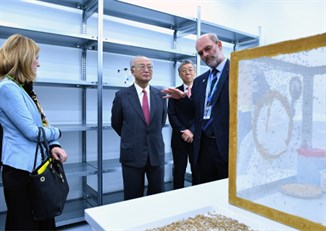Research facilities by three different organisations in three different countries were very recently opened. Each is designed to develop new techniques in the battle against public health insect pests.
For some time, the industry, particularly in Europe, has reluctantly recorded the closure, or reduction, of relevant research facilities. So it is good news that three new centres have very recently opened.
Namely:
- The Power Centre, in Crawley, West Sussex, UK by Rentokil Initial on 14 September
- Koppert Biological Systems information centre in Berkel en Rodenrijs, Netherlands on 14 September
- Insect Pest Control Laboratory (IPCL), part of IAEA at Seibersdorf, Austria on 25 September
The Power Centre – Rentokil Initial
On 14 September, Rentokil Initial officially opened their new UK Innovation, Science and Training Centre – to be known as the Power Centre.
This £2m investment, based in Crawley, West Sussex, is designed to bring together the company’s innovation and scientific community with its renowned technical training academy to enhance its expertise and leadership in pest control. The objective being to ensure that the company remains the global leader in the commercial pest control industry.
Features of the Power Centre include insect culture rooms that provide a controlled environment where bed bugs and many other insects are able to develop and be analysed. On the insect front, there are also fly rooms, which are small rooms where multiple flies can be released to test the efficiency of products under scrutiny. The company says now has the largest collection of pest insects in Europe.
For rodents, there are behaviour areas – four for rats and six for mice. These are used to monitor rodent behaviour and to create more effective detection tools. Uses tested include 24/7 CCTV style monitoring and computer porgrammes to analyse behaviour.
With an eye to practical training, there are seven scenario training rooms that match the environments in which Rentokil colleagues work. These scenarios include a supermarket, hotel bedroom, loft space, commercial kitchen, grain store, office and washroom. These have been specially designed to provide technicians with realistic representations of their working environments.
The centre is named after Stewart Power, Rentokil Marketing & Innovation Director who lost his battle with cancer earlier this year. The Centre was opened by members of the Power family accompanied by Michael More-Molyneux, Lord-Lieutenant of Surrey, Sir Adrian White CEB, Deputy Lord-Lieutenant of Surrey, Henry Smith MP for Crawley and the Mayor of Crawley, Councillor Brian Quinn – as seen below.
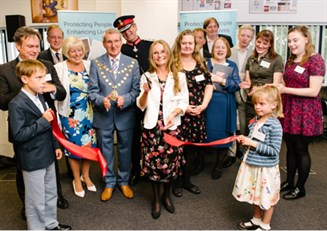 The official opening – the Power family cut the ribbon |
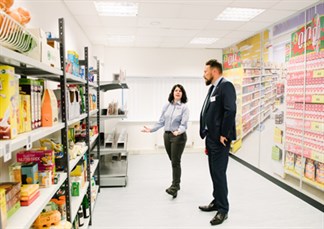 Inspecting one of the training rooms – a supermarket Inspecting one of the training rooms – a supermarket |
Royal opening for Koppert Biological Systems
King Willem-Alexander of the Netherlands opened the new information centre of Koppert Biological Systems also on 14 September. This year, this Dutch owned family company celebrates 50 years as a leading force in biological crop protection and sustainable cultivation.
As their company name implies, Koppert Biological Systems develops sustainable solutions for the cultivation of food crops and ornamental plants. However, some research and products do have relevance in the professional pest control market, for example in the area of fly control.
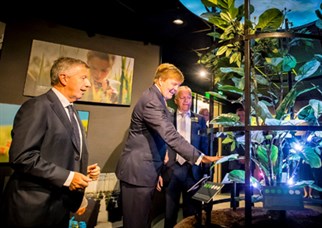 King Willem-Alexander officialy opens the centre King Willem-Alexander officialy opens the centre |
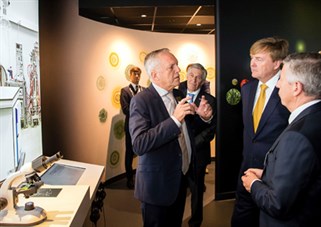 On a tour of the research facilities On a tour of the research facilities |
Insect Pest Control Laboratory opened in Austria
The International Atomic Energy Agency (IAEA) base in Seibersdorf, Austria opened on 25 September the doors of a new laboratory to help countries use a nuclear technique to combat insect pests that spread disease and damage crops, such as mosquitoes and various flies.
With over 1,700 square meters of laboratory space, the modern Insect Pest Control Laboratory (IPCL) will substantially increase the Agency’s ability to assist Member States in applying the Sterile Insect Technique (SIT). This form of insect birth control uses radiation to sterilize male insects, which are reared in large numbers and released in a target area to mate with wild females. Since they do not produce any offspring, the pest population is reduced over time.
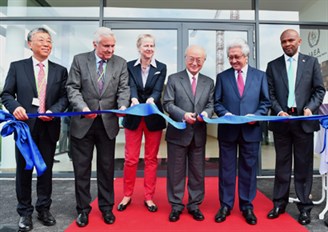
L to r: FAO Assistant Director General Ren Wang, German Ambassador Friedrich Dá¤uble, Austrian Ambassador Christine Stix-Hackl, IAEA Director General Yukiya Amano, Indonesian Ambassador Darmansjah Djumala, South African Ambassador Tebogo Seokolo |
IAEA Director General Yukiya Amano (centre) together with delegates and Member States’ representatives tour the site of the newly inaugurated Insect Pest Control Laboratory |


